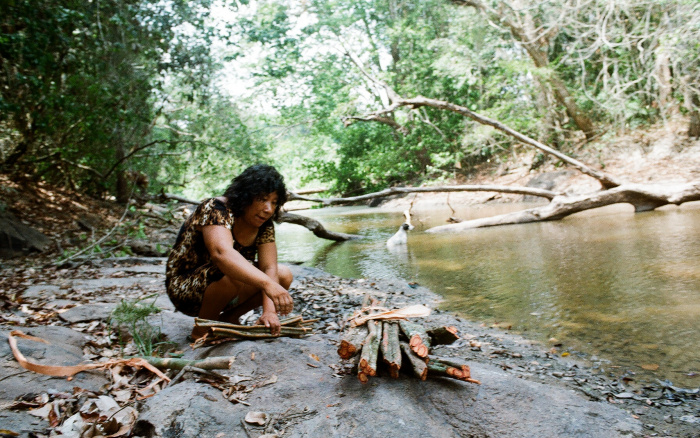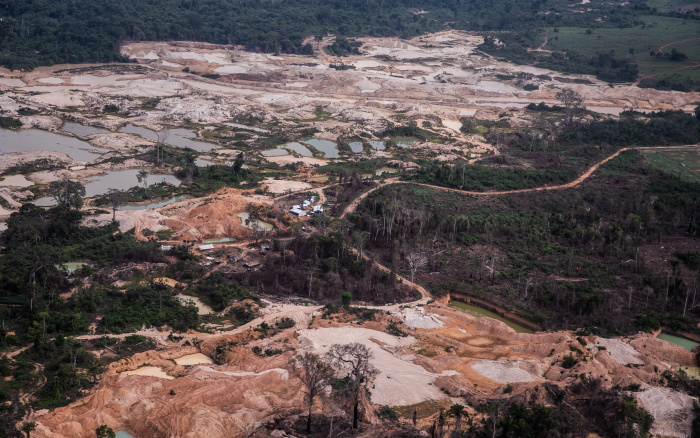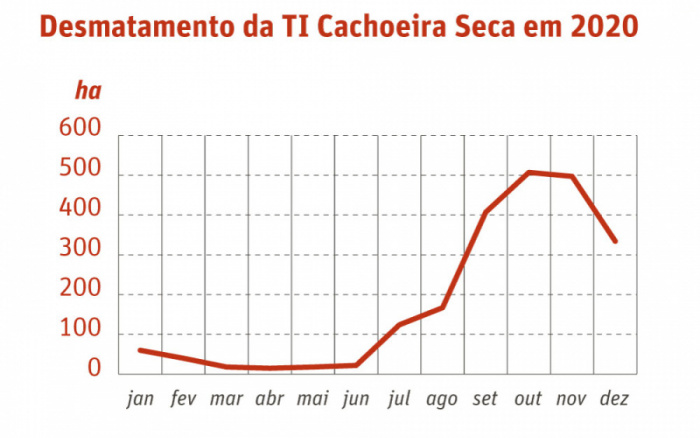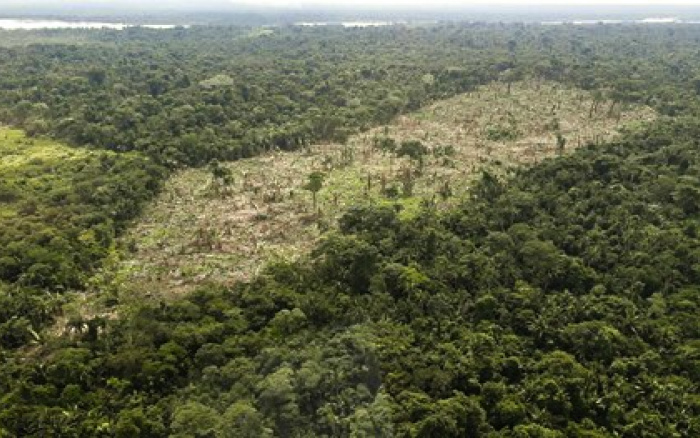Você está na versão anterior do website do ISA
Atenção
Essa é a versão antiga do site do ISA que ficou no ar até março de 2022. As informações institucionais aqui contidas podem estar desatualizadas. Acesse https://www.socioambiental.org para a versão atual.
Deforestation in the Cachoeira Seca Indigenous Land explodes after the removal of the inspection base
Thursday, 04 de March de 2021 
No budget, no disintrusion
Advancement of mining threatens Kayapó IL
Esta notícia está associada ao Programa:
1,700 hectares were deforested between September and December; Court decision to carry out disintrusion of the area expires in May, but the government has not yet received a budget from Funai
“Our area has become a ‘business counter’. Everyone lives in our area, stealing wood, selling land, and prospecting for gold, ”says chief Mobu Odo Arara, from the Cachoeira Seca Indigenous Land (Pará State). In just four months, between September and December 2020, more than 1,700 hectares were deforested in the IL, the third most deforested in the Xingu basin in 2020. This area, almost four times higher than the total deforested in the first eight months of the year, coincides with the withdrawal of an Ibama inspection base in the region.
The IL, home of the Arara, indigenous people of recent contact, carries the negative record of being one of the most deforested ILs in the country in the last six years due to invasions, illegal logging, the advancement of cattle and land grabbing. In 2020, however, deforestation slowed down, likely as a result of the creation of a Ibama inspection headquarters nearby the IL, and also due to successive inspections to combat deforestation that were carried out since April, also led by the environmental inspection institution.
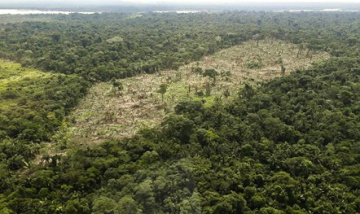
“It is difficult to understand why the Ibama base was removed from the Cachoeira Seca IL when threats to the territory have not yet ceased and the process of removing invaders has not yet been completed. The effects of the inspections at the beginning of the year 2020 show the effectiveness of comprehensive and permanent protection actions in the territories that are under continuous pressure from illegal activities”, comments Elis Araújo, lawyer at ISA.
With the increasing encroachment, deforestation in Cachoeira Seca, which used to be concentrated on its northern border and in the eastern region, is now distributed throughout most of the indigenous territory.
In 2016, during the peak of the invasion, the equivalent of 1,200 illegal timber trucks were removed, and in 2019, two years ago, 7,900 hectares were deforested within the Indigenous Land. Since 2009, according to Prodes, more than 324 km² of forest have been cleared, an area larger than the municipality of Cuiabá, the capital of Mato Grosso State.
The data are from the 22nd Sirad X bulletin, the deforestation monitoring system of the Xingu + Network, an articulation of indigenous, riverine and civil society organizations for the defense of the rights of the Xingu peoples and the socio-environmental corridor of protected areas in the basin.
No budget, no disintrusion
The main demand today is for the disintrusion of non-indigenous occupants in the area and the effective implementation of a protection plan in the territory.
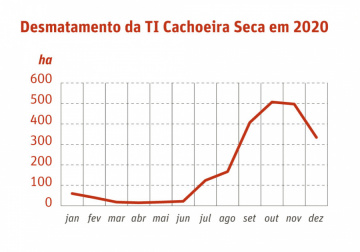
In November of last year, the Federal Court of the 1st Region ordered the Union and Funai to complete the land regularization processes of the Cachoeira Seca and Paquiçamba ILs. [Read the decision in full]
The agencies have 90 working days to present a work schedule, which includes the demarcation, approval and disintrusion of the territories. In case of non-compliance with the deadlines, the government must pay a fine of R$ 10 thousand reais for each day of delay. The deadline expires in May this year, but sincethen, four months after the court’s decision, the Federal Budget Secretariat of the Ministry of Economy has not received the budget from the indigenous agency. Funai did not respond to the interview request until this report was closed.
The decision is a response to the public civil action filed by the Federal Public Ministry in December 2015, two weeks after the issuance of the Belo Monte Hydroelectric Plant Operation License, which alleged the ethnocide of the nine indigenous peoples affected by the plant, as a result of the destruction the social organization, customs, languages and traditions of indigenous groups impacted by the plant, as well as the lack of protection for indigenous lands. [Know more]
“We want that word from the judge to be fulfilled. We are waiting and meanwhile the loggers and land grabbers are invading our area, and they are the ones who benefit, we are the ones who are losing. We live by fishing and without the land we are nobody, it is our future that is at stake. We want justice ”, said Mobu Odo.
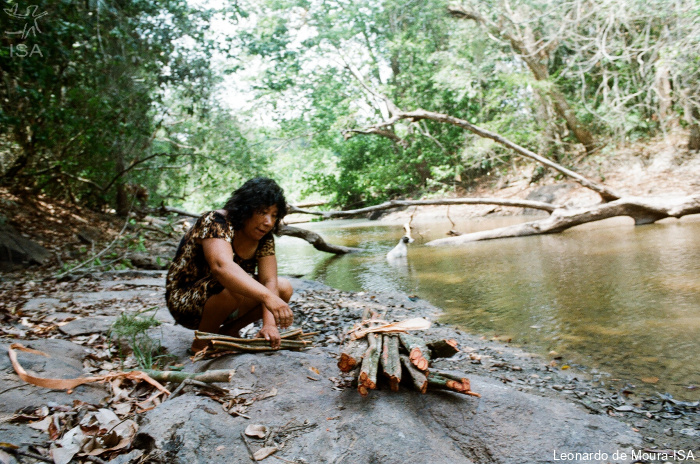
Advancement of mining threatens Kayapó IL
In December alone, 283 hectares were deforested in the Kayapó Indigenous Land due to illegal mining, the highest rate since May 2018 - when 343 hectares were deforested. The IL was the fourth most deforested in the Xingu basin in 2020, with 2,100 hectares of forest destroyed.
The new open areas are distributed in the northeastern region, on the banks of the Branco river and its tributaries, in the east in the Trairão river and in the southeast region, along the banks of the Fresco and Arraias rivers, all tributaries of the Xingu river.
The illegal mining activity at TI Kayapó started in the early 1980s and fluctuated with more or less intensity in the following years. A study by the Xingu + Network and the ISA, published in July last year, revealed a new wave of mining in the interior of TI from 2018: from 1988 to 2017, 3.87 thousand hectares had been deforested in the region, a rate that rose to 5.58 thousand only between 2018 and 2020. [Access the "Dossier illegal mining in the Xingu basin" in full]
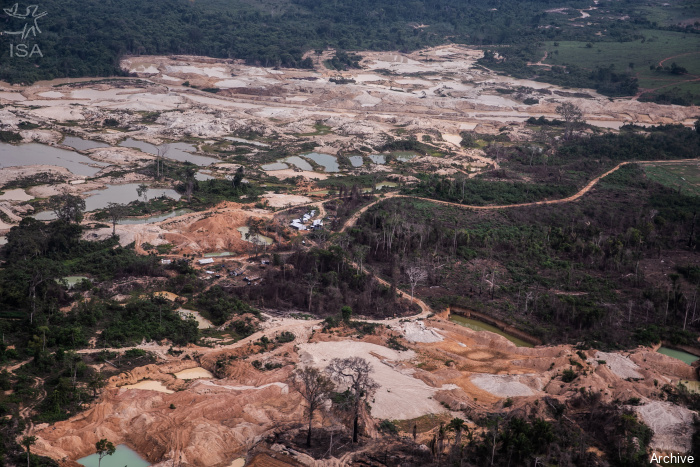
Isabel Harari
ISA
Imagens:
Arquivos:
| Attachment | Size |
|---|---|
| 6.78 MB |



